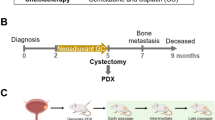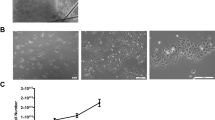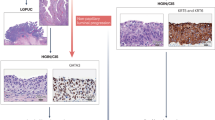Abstract
An explant culture technique was used to culture normal urothelium from patients with muscle-invasive bladder cancer (transitional cell carcinoma, TCC) (n = 11) and from non-tumour-bearing patients (n = 60). Cell cultures were examined for expression of p53 using the monoclonal antibody p53-240. There was a statistically significant increase in p53 expression in normal urothelial cell cultures from patients with TCC (P < 0.0005). Normal urothelial cultures from patients with TCC also showed more rapid proliferation in vitro when compared with non-tumour-bearing patients (P < 0.0005). A subgroup of non-tumour-bearing patients (n = 14) showed > 5% of cells expressing p53. p53 expression in this subgroup was found to correlate with cell proliferation in vitro (r2 = 0.766). None of these urothelial specimens was observed to express p53 when paraffin-embedded preparations were stained with p53-D07 antibody prior to culture. The rate of cellular proliferation in this subgroup did not differ from that of normal urothelium from TCC patients. Twenty-two paraffin-embedded, muscle-invasive TCC specimens were also evaluated for p53 expression using p53-D07. The expression of p53 in these tumours did not differ from that observed in normal urothelial cell cultures from patients with TCC (P = 0.26). This study identifies an overexpression of p53 in normal urothelial cells from patients with TCC and in proliferating cultures from a significant subgroup of patients without malignant disease. Increased p53 expression in normal cultured urothelial cells from patients with bladder cancer implies a global change in the mechanisms controlling urothelial cell division. This may represent an early step in the pathway to carcinogenesis.
This is a preview of subscription content, access via your institution
Access options
Subscribe to this journal
Receive 24 print issues and online access
$259.00 per year
only $10.79 per issue
Buy this article
- Purchase on Springer Link
- Instant access to full article PDF
Prices may be subject to local taxes which are calculated during checkout
Similar content being viewed by others
Author information
Authors and Affiliations
Rights and permissions
About this article
Cite this article
Harney, J., Murphy, D., Jones, M. et al. Expression of p53 in urothelial cell cultures from tumour-bearing and tumour-free patients. Br J Cancer 71, 25–29 (1995). https://doi.org/10.1038/bjc.1995.6
Issue Date:
DOI: https://doi.org/10.1038/bjc.1995.6
This article is cited by
-
A new and reliable culture system for superficial low-grade urothelial carcinoma of the bladder
World Journal of Urology (2007)
-
BRCA1 and p53 protein expression in cultured ovarian surface epithelial cells derived from women with and without a BRCA1 germline mutation
Archives of Gynecology and Obstetrics (2006)
-
Human papilloma virus and p53 expression in bladder cancer in Egypt: Relationship to schistosomiasis and clinicopathologic factors
Pathology & Oncology Research (2006)



